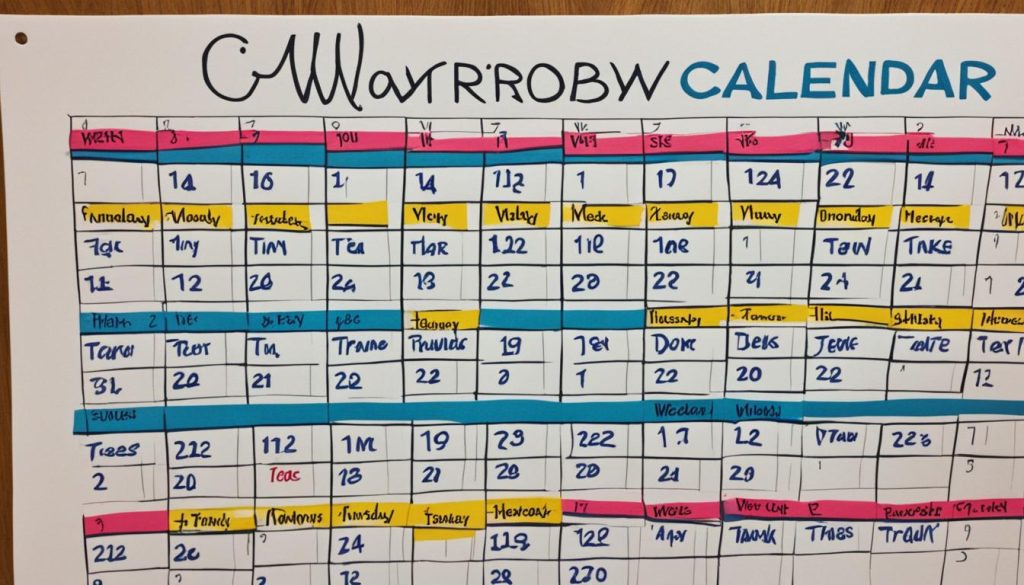Are you considering taking on the challenge of running a marathon? If so, one of the first questions you may have is, “How long does it take to train for a marathon?” The duration of marathon training is essential to ensure both physical and mental preparations for the race. According to experts, it typically takes about 16 to 20 weeks to train for a marathon, giving you ample time to build your fitness and endurance levels.
During this training period, you will follow a structured plan that focuses on various aspects of marathon preparedness, such as building aerobic capacity, lactate threshold, strength, motivation, discipline, and consistency. It’s not just about increasing your mileage; it’s about developing a stronger heart, improving blood circulation, enhancing muscular endurance and efficiency, and boosting your overall aerobic capacity.
Training for a marathon is not just about physical adaptations; it is also a mental journey. The long training runs, the discipline required to stick to your training schedule, and the perseverance to push through challenging moments all contribute to your overall success on race day. Additionally, proper training is necessary to minimize the risk of injuries and ensure that you perform at your best when it matters most.
Keep in mind that the duration of marathon training may vary depending on your current fitness level, race experience, and running background. If you are an experienced runner with a higher mileage base, a 12-week training plan might suffice. However, if you are a beginner or starting from scratch, it is recommended to allocate 16 to 20 weeks for training to ensure adequate preparation and injury prevention.
In conclusion, training for a marathon is a demanding but rewarding endeavor. By dedicating the necessary time and effort to your training plan, you can increase your chances of crossing that finish line with a sense of accomplishment. Whether you’re a seasoned runner or new to the sport, it’s never too early to start preparing for your next marathon.
What Happens to Your Body During Marathon Training?
During marathon training, your body undergoes several beneficial adaptations that contribute to your overall performance. These adaptations occur gradually over time as you follow a structured training plan. Here’s a breakdown of what happens to your body during marathon training:
1. Cardiovascular System
Marathon training significantly improves the cardiovascular system. Your heart becomes stronger and more efficient at pumping blood, supplying oxygen and nutrients to the working muscles. Simultaneously, the blood vessels become more efficient at distributing oxygen-rich blood to the muscles, helping to enhance endurance and performance.
2. Muscular Changes
As you increase your training volume, muscles go through various adaptations. They become larger and stronger, allowing you to generate more force and endure the demands of long-distance running. Additionally, your muscles become more efficient at storing and utilizing glycogen (stored glucose) for energy, providing you with the fuel needed to sustain your marathon pace.
3. Improved Aerobic Efficiency
One of the key goals of marathon training is to enhance your body’s aerobic capacity. This involves increasing the number and size of mitochondria, the powerhouse of cells responsible for energy production. With higher mitochondrial density and increased aerobic enzyme activity, your muscles become more efficient at utilizing oxygen, enabling you to sustain a faster pace for longer periods of time.
4. Strengthening Supporting Structures
Marathon training not only focuses on the muscles but also strengthens the supporting structures, including tendons, ligaments, joints, and bones. These adaptations reduce the risk of injury during the rigorous demands of marathon running, ensuring that your body can withstand the prolonged impact and stress.
To summarize, marathon training leads to significant physiological adaptations in your body, such as cardiovascular improvements, muscular changes, increased aerobic efficiency, and strengthened supporting structures. These adaptations are crucial for a successful performance on race day, allowing you to endure the marathon distance and achieve your goals.

How Long Does It Take to Train for a Marathon Depending on Your Fitness Level?
The duration of marathon training can vary depending on your current fitness level. For active runners with race experience and a higher mileage base, a 12-week training plan might be sufficient. However, for beginners or individuals starting from scratch, it is recommended to follow a 16 to 20-week training plan to ensure proper preparation and avoid injuries.
Factors such as age, current fitness level, weekly mileage, race experience, and personal schedule should be considered when determining the appropriate length of the training cycle. It’s important to gradually build up your endurance and mileage to avoid overexertion and increase your chances of successfully completing the marathon.
Here is a comparison table to help you determine the recommended training time based on different fitness levels:
| Fitness Level | Recommended Training Length |
|---|---|
| Active runners with race experience and higher mileage base | 12 weeks |
| Beginners or individuals starting from scratch | 16 to 20 weeks |
Remember, this is just a general guideline, and individual circumstances may vary. It’s essential to listen to your body, consult with a healthcare professional or a running coach, and personalize your training plan to ensure it suits your specific needs and abilities.

Additional Considerations
- Age: Older individuals may require a longer training period to allow for sufficient recovery and adaptation.
- Weekly Mileage: The higher your weekly mileage, the more endurance and conditioning you have, which may reduce the overall training time.
- Race Experience: If you have previously completed a marathon or other long-distance races, you may have a better understanding of your capabilities and be able to shorten the training period.
By following a well-structured training plan and allowing adequate time for preparation, you can increase your chances of achieving your marathon goals and enjoying a successful race day experience.
How Long Does It Take to Train for a Marathon?
If you’re new to running and want to tackle a marathon, it’s crucial to establish a running base before jumping into marathon training. Building a solid foundation for longer distances typically involves regular running for a period of about six to twelve weeks. This timeframe allows your body to adapt to the demands of running and helps prevent injuries as you gradually increase your training volume.
Depending on your individual circumstances and fitness level, it may take several months or even up to a year to develop the necessary fitness and strength for marathon training. Patience and consistency are key as you gradually increase your running mileage and aim to reach a weekly volume of 15 to 25 miles. This gradual approach not only prepares your body for the unique challenges of marathon-specific training but also reduces the risk of burnout or overuse injuries along the way.
Remember, the journey to a marathon is as much about the mental endurance as it is about the physical preparation. Embrace the process, set realistic goals, and trust in your ability to progress at your own pace. With dedication and perseverance, you’ll conquer the marathon distance and cross that finish line with pride.
Benefits of Establishing a Running Base Before Marathon Training
- Minimizes the risk of injuries
- Gradually increases endurance and stamina
- Builds mental resilience and discipline
- Allows time for the body to adapt to the demands of running
By taking the time to develop a strong running foundation, you’ll be better equipped to tackle the challenges of marathon training and increase your chances of a successful race day experience.

| Running Mileage (Weekly) | Training Duration |
|---|---|
| Less than 10 miles | 6-12 months |
| 10-15 miles | 4-6 months |
| 15-20 miles | 3-4 months |
| 20-25 miles | 2-3 months |
| Above 25 miles | 2-3 months (depending on individual factors) |
What is Involved in a Standard Marathon Training Plan?
A standard marathon training plan typically lasts 16 to 20 weeks and is designed to gradually build your fitness and endurance, preparing you for the demands of a marathon race. The schedule includes a combination of different types of runs and conditioning activities to optimize your performance.
Here is an overview of what you can expect in a standard marathon training plan:
1. Gradual Mileage Increase
Throughout the training plan, you will gradually increase your weekly mileage to build endurance. This is done by adding miles to your shorter runs during the week and gradually extending the distance of your long runs on the weekends. The gradual increase in mileage allows your body to adapt and become more efficient in using oxygen, improving your aerobic capacity.
2. Conditioning Activities
In addition to running, a well-rounded marathon training plan includes conditioning activities to enhance overall fitness and strength. These activities may include hill sprints, circuits, and strength training exercises. Incorporating these activities into your training routine will improve your muscular endurance, power, and speed, helping you become a stronger and more efficient runner.
3. Rest Days
Rest days are essential in any training plan to allow your body to recover and reduce the risk of overuse injuries. It’s important to listen to your body and take designated rest days to prevent burnout and promote optimal performance. Use these rest days to focus on active recovery, such as stretching, foam rolling, or engaging in low-impact activities like cycling or swimming.
4. Cross-Training
Incorporating cross-training activities into your marathon training plan can provide additional fitness benefits and reduce the risk of injury. Cross-training activities like cycling, swimming, and yoga can help improve cardiovascular fitness, flexibility, and muscular balance. These activities also provide a mental break from running and can help prevent overuse injuries that may result from repetitive movements.
5. Tapering
The final weeks before the marathon race are dedicated to tapering, which involves reducing the training volume to allow for maximum rest and recovery. Tapering gives your body time to repair and adapt, ensuring you arrive at the race feeling fresh and ready to perform at your best. During this period, the focus shifts from training to maintaining fitness and ensuring proper rest before the big day.
Following a standard marathon training plan will help you efficiently build your endurance, strength, and mental resilience, giving you the best chance of achieving your race goals. Remember to listen to your body, stay consistent, and trust in the process.

| Week | Short Runs (Miles) | Long Run (Miles) | Conditioning Activities |
|---|---|---|---|
| 1 | 3 | 4 | Hill Sprints |
| 2 | 3 | 5 | Circuits |
| 3 | 4 | 6 | Strength Training |
| 4 | 4 | 7 | Hill Sprints |
| 5 | 5 | 8 | Circuits |
| 6 | 5 | 10 | Strength Training |
| 7 | 6 | 12 | Hill Sprints |
Conclusion
Training for a marathon requires dedication and a well-structured plan. It is generally recommended to follow a 16 to 20-week training program to ensure proper preparation and avoid injuries. This training period allows for important adaptations in the body, such as improved aerobic capacity, muscular endurance, cardiovascular function, and overall efficiency.
By following a training plan and gradually building up mileage, runners can increase their chances of successfully crossing the marathon finish line. It is essential to prioritize consistency, discipline, and gradual progress to prevent overuse injuries and burnout. A marathon training plan should include a balanced mix of running, conditioning activities, rest days, and cross-training exercises to improve overall fitness and prevent overuse injuries.
Remember that the duration of training can vary depending on individual factors such as age, current fitness level, and previous race experience. Beginners or those starting from scratch may need a longer training period to develop the necessary fitness and strength. It is crucial to listen to your body, seek professional guidance if needed, and adjust the training plan accordingly to ensure a safe and successful marathon journey.




